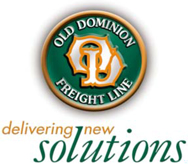

March 15, 2006
Via EDGAR Submission
Securities and Exchange Commission
Division of Corporation Finance
100 F Street, N.E.
Washington, D.C. 20549
Attention: Joe Foti
| Re: | Old Dominion Freight Line, Inc. |
Form 10-K for the Fiscal Year Ended December 31, 2004
File No. 000-19582
Ladies and Gentlemen:
This letter is submitted in response to the letter dated March 2, 2006 from Joe Foti of the Staff (the “Staff”) of the Securities and Exchange Commission (the “Commission”) to Earl E. Congdon, the Chief Executive Officer of Old Dominion Freight Line, Inc. (the “Company”) regarding the Company’s Form 10-K for the fiscal year ended December 31, 2004 (the “2004 Form 10-K”).
The comments and responses set forth below are keyed to the comments and the headings used in the Staff’s March 2, 2006 letter. Where appropriate, the Company has responded to the Staff’s comments by: 1) proposing changes to the disclosure in the 2004 Form 10-K, which would be filed as an amendment to the 2004 Form 10-K (the “Form 10-K/A”); or 2) proposing changes to the disclosures in the Company’s Form 10-K for the fiscal year ended December 31, 2005 (the “2005 Form 10-K”) and, if applicable, future filings with the Commission. Page numbers referred to in this letter reference the applicable pages of the 2005 Form 10-K, unless otherwise noted. Capitalized terms used but not otherwise defined herein have the meanings given them in the 2004 Form 10-K.
Form 10-K for the Fiscal Year Ended December 31, 2004
Note 1. Significant Accounting Policies
Revenue and Expense Recognition
Allowance for Uncollectible Accounts, page 32 of the 2004 Form 10-K
Staff Comment: We note your response to our prior comment 2 and 4. In this regard, please include in your note 1 to your future consolidated financial, your significant accounting policies for allowance for uncollectible accounts and revenue adjustments, similar to your proposed MD&A disclosure in your response to our prior comment 2 and 4.
Response: We will include, in Note 1 to our financial statements that we file with the Commission, the proposed MD&A disclosure included in our response letter to the Staff dated November 10, 2005, unless and until future events require us to alter or otherwise modify in any way such disclosure.
Other
Staff Comment: We note your response to our prior comments 2, 4, 5, 6, 7 and 8. As indicated in your response letter dated November 10, 2005, please file your proposed changes in an amendment to your Form 10-K for the Fiscal Year Ended December 31, 2004 as soon as practical.
Response: In response to prior comment 8 and consistent with response 8 in our response letter to the Staff dated November 10, 2005, we will file a Form 10-K/A with the Commission as soon as practical that contains a revised independent auditor’s report from Ernst & Young LLP. The revised independent auditor’s report can be found on page two of our Form 10-K/A.
Pursuant to our discussions and agreement with Mr. Jeff Jaramillo of the Staff on March 3, 2006, we will expand, clarify and provide additional information, as proposed in our response to prior comments 2, 4, 5, 6 and 7 in our response letter to the Staff dated November 10, 2005, in the Company’s 2005 Form 10-K. Our response to these prior comments can be located in our 2005 Form 10-K as follows:
| • | prior comment 2 – “Note 1. Significant Accounting Policies” of Notes to the Financial Statements on page 30; |
| • | prior comment 4 – “Critical Accounting Policies” section of our MD&A on page 22 and “Note 1. Significant Accounting Policies” of Notes to the Financial Statements on page 30; |
| • | prior comment 5 – “Note 1. Significant Accounting Policies” of Notes to the Financial Statements on page 31; |
| • | prior comment 6 – “Note 3. Leases” of Notes to the Financial Statements on page 36; and |
| • | prior comment 7 – “Note 9. Quarterly Financial Information” of Notes to the Financial Statements on page 41. |
2
We would also like to advise the Staff that effective January 1, 2005, we changed our accounting policy for tires on equipment. Prior to 2005, we recorded all new, used and recapped tires as a prepaid asset when originally acquired and amortized those tires over their estimated useful life. Under our new policy, we capitalize the original tires acquired on our rolling stock as part of the total cost of such rolling stock and amortize the entire asset over its estimated useful life. Replacement tires are expensed when placed in service. We received a Letter of Preferability from Ernst & Young LLP, our independent registered public accounting firm, which is included in our 2005 Form 10-K as “Exhibit 18.1”. We describe this change in accounting principle, which was accounted for in accordance with APB No. 20, Accounting Changes, in “Note 1. Significant Accounting Policies – Tires on Equipment” on page 31 of our 2005 Form 10-K. In that footnote, we also include a clarification of the method of accounting for tires prior to 2005 in response to the Staff’s prior comment 5.
Closing
We hope that the above responses will be acceptable to the Staff. If you have any questions regarding the foregoing, kindly contact the undersigned at 336.822.5302. Thank you for your time and attention.
| Sincerely, |
| /s/ John P. Booker, III |
| John P. Booker, III |
| Vice President – Controller |
| cc: | Earl E. Congdon |
J. Wes Frye
Adam N. Satterfield
3